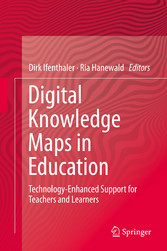Suchen und Finden
Digital Knowledge Maps in Education - Technology-Enhanced Support for Teachers and Learners
Mehr zum Inhalt

Digital Knowledge Maps in Education - Technology-Enhanced Support for Teachers and Learners
Digital knowledge maps are 'at a glance' visual representations that enable enriching, imaginative and transformative ways for teaching and learning, with the potential to enhance positive educational outcomes. The use of such maps has generated much attention and interest among tertiary education practitioners and researchers over the last few years as higher education institutions around the world begin to invest heavily into new technologies designed to provide online spaces within which to build resources and conduct activities. The key elements of this edited volume will comprise original and innovative contributions to existing scholarship in this field, with examples of pedagogical possibilities as they are currently practiced across a range of contexts. It will contain chapters that address, theory, research and practical issues related to the use of digital knowledge maps in all aspects of tertiary education and draws predominantly on international perspectives with a diverse group of invited contributors. Reports on empirical studies as well as theoretical/conceptual chapters that engage deeply with pertinent questions and issues raised from a pedagogical, social, cultural, philosophical, and/or ethical standpoint are included. Systematic literature reviews dealing with digital knowledge mapping in education are also an integral part of the volume.
Dr. Ifenthaler's research interests focus on the learning-dependent progression of mental models, problem solving, decision making, situational awareness, game-based learning, and emotions. He developed an automated and computer-based methodology for the assessment and analysis of graphical and natural language representations (SMD Technology, HIMATT, AKOVIA). Additionally, he developed components of course management software and an educational simulation games (DIVOSA, SEsim). He is also interested in the development of educational software and learning management systems (LMS). Dr. Hanewald has worked on funded research projects investigating 'Pedagogical Agents for Modelling On-Line and Computer-Interactive Learning' (PEDANT) and 'Reusable Learning Objects' (RELO). She has also conducted research into the use of ICT in education, including online and mobile technologies with several grants for projects in these areas. Her contribution to the wider community includes being co-editor for the ICT in Education Journal (2007-2010), serving as a state council committee member of the Computer in Education Group of Victoria (2006-2010), a Consulting Editor for the Australian Journal of Teacher Education (2007-present)and an Editorial Advisory Board Member for the Handbook on Collaborative Learning using Concept Mapping (2010).
Alle Preise verstehen sich inklusive der gesetzlichen MwSt.







